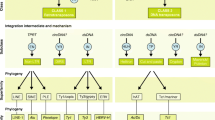Abstract
A computer virus is merely a small piece of program in nature, and similar to that of a computer virus, an organism may be considered as an information system in nature. This paper analyzes above idea from different ways. 1) DNA sequence satisfies the basic requirements of an information system; 2) The controls of a man and a robot both obey the principle of cybernetics; 3) How a man can have ideas but a robot has no such capacity; 4) The advantages of understanding a living organism from the point of view of information systems.
Similar content being viewed by others
References
Lu X, Sun Z R, Chen H, Li Y D. Characterizing self-similarity in bacteria DNA sequences. Physical Review E, 1998, 58(3): 3578–3584
Li Y D. Information and life. Chemistry, 2001, 64(10): 601–607 (in Chinese)
Li Y D. Understanding genome from information system point of view. Acta Electronica Sinica, 2001, 29(12A): 1731–1734 (in Chinese)
Author information
Authors and Affiliations
Corresponding author
Additional information
Yanda Li was born on Oct. 1936 in Dongguan, Guangdong Province in China. He was graduated from Department of Automatic Control, Tsinghua University in 1959. From 1979 to 1981, he visited the Massachusetts Institute of Technology, USA, and engaged in signal processing. He is Professor in Tsinghua University. He is also Member of Chinese Academy of Sciences (CAS), Member of The Executive Committee of the Fifth CASAD Presidium, the Chairperson of Division of Information Technical Science of CAS. He is Editor-in-Chief of Frontiers of Electrical and Electronic Engineering in China. He has a long interest in signal processing theory and its applications, including reconstruction of signal using partial data, wavelet analysis, and fractal signal processing. His theories have been used in many areas, particularly in oil exploration. He has also delved into areas of intelligent signal processing and systems, developed theoretical models of artificial neural network, fuzzy system and evolutionary algorithm, and applied them to the intelligent control of information networks. He also engaged in areas such as information mining and compression, organization of multimedia data in high-speed network, and intelligent control of industrial process and equipment. Since 1997, He has devoted himself to bioinformatics, applying information processing methods for complex system to molecular biology. He pioneered areas such as analysis of the information structure of genome sequence and modeling and simulation of gene control networks. He has published a series of books including Signal Reconstruction and Its Application and Neural Network Signal Processing and more than 100 scientific papers. He consecutively won the National Natural Sciences Award, Scientific and Technological Progress Award of National Education Commission, Beijing Scientific and Technological Progress Award, National Excellent Scientific and Technological Books, and National Special-Class Teaching Achievement Award.
About this article
Cite this article
Li, Y. Life and information. Front. Electr. Electron. Eng. China 5, 405–410 (2010). https://doi.org/10.1007/s11460-010-0102-2
Received:
Accepted:
Published:
Issue Date:
DOI: https://doi.org/10.1007/s11460-010-0102-2




